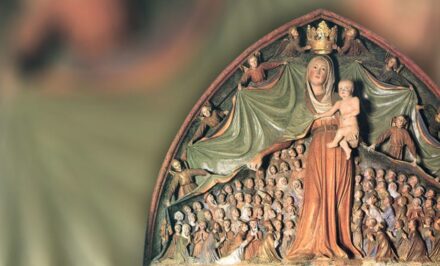Brazil, Fr. Matheus da Silva Bernardes •
The text published by the Schoenstatt General Presidium on the official schoenstatt.com website on 10 March 2021 is in keeping with the tone of previous texts, that is, the absence of constructive self-criticism and the complete inability to emphathize with victims of abuse. –
Just when we thought that all of the issues around Fr. Joseph Kentenich, the founder of the International Schoenstatt Movement, were beginning to calm down, the emergence of new situations show that the matter is far from closed.
This problem came to light when historian Alexandra von Tauffenbach revealed on the katholisch.de website about a year ago that in researching the secret archives Pius XII’s papacy, she found a large volume of material pertaining to the period of the Apostolic Visitation to Schoenstatt,, carried out by the Jesuit priest Sebastian Tromp, the advisor to the Holy See. In this material, the historian found a series of allegations of abuses committed by Fr. Joseph Kentenich, including sexual abuse.
The result of Alexandra von Tauffenbach’s work can be seen as the first volume of the “Vater darf das” published in German by Traugott Bautz publishers. There are indications that a translation of this book into Spanish is underway, and the author has also stated that a second volume will be published soon.
Since Alexandra’s interview on the katholisch.de website, we need to recognize that the official leadership of the Schoenstatt Movement has made a series of embarrassing statements. The first, given a day after the first interview, was at the very least disastrous in attacking the reputation of the historian. Then, the absence of a single voice, that expresses concern in clarifying the circumstances and the facts of the accusations of abuse against Fr. Joseph Kentenich has led several Movement members to question the degree of secrecy within the official leadership of the movement. At the same time, the lack of a word of solidarity for the victims is disappointing.
A few days ago, the Bishop of the Diocese of Trier, Stephan Ackermann published the decision that Fr. Joseph Kentenich’s beatification process will not be reassessed by another historical commission, but by a multidisciplinary team. With this, the diocesan bishop is clearly saying, in contrast with the official Movement channels and the Sisters of Mary in particular, that he does not intend to keep the matter hidden. A historical commission for a beatification process must keep its work secret but an interdisciplinary team does not need to do so.
After the publication of the resolution, Stephan Ackermann gave an interview published on the paulinus.de website, in which he mentioned an allegation of sexual abuse committed by Fr. Joseph Kentenich and not against a Sister of Mary – as the case presented in volume one of “Vater dar das” – but against a US citizen during the time he lived in Milwaukee.
The canonical process, based on what we can understand from the interview, was opened in Milwaukee/United States. The situation was made known to the Diocese of Trier/ Germany, where the beatification process was already underway.
In the publication of “Information by the Schoenstatt General Presidium” on 10 March, it is clear that the official leadership of the Movement learned about the case in 1997. It was, however, bound to secrecy because the canonical process was underway in the Archdiocese of Milwaukee.
Nobody should demand, therefore, that the General Presidium should have made this information available. This is clear! However, the text of 10 March does not, at any point, express the slightest self-criticism to the secretive position and express any empathy for the victim, this time a US citizen, who is still alive, or his family.
Reading this text, only one sentiment remains: secrecy will still reign for a long time among the official leadership of the Movement and a false messianic paradigm will prevent it from seeing the founder not as a “god” but as a human being like all of us. A human being with faults, which at no point means that he is less holy. The attitude and actions to defend Fr. Joseph Kentenich at all costs do not any way help the beatification process or the Movement.
Finally, we need to conclude that this reaction to the offensive text by the General Presidium showing that lack of empathy for the victims no longer hold a place in the Church. Wanting to accuse and seeking pseudo-psychological justifications for the victims only serves to further disregard them. Victims will always be victims! It does not matter whether it is as the result of poor interpretation or any other circumstance; a victim should be welcomed, heard, and where possible, be given retribution.
Having not said a single word to the US citizen who accused Fr. Joseph Kentenich of sexual abuse in 1994 — just as the official leadership has so far not said anything in any of its statements and publications to the former Sisters of Mary who also accused him midway through the last century – is the very least, cruel. Secrecy sustained by a false messianic paradigm and lack of empathy for the victims are not Gospel values. It does not belong to the Good News of the Kingdom of God brought into being by Jesus of Nazareth.
The opinions expressed in opinion articles are the exclusive responsibility of those who expressed these views and do not necessarily represent the thinking of the schoenstatt.org editorial team.
Original: Portuguese. Translation: Sarah-Leah Pimentel, Cape Town, South Africa














